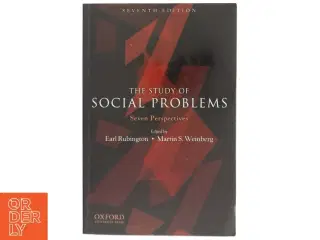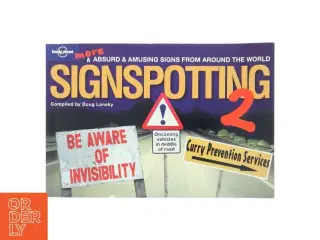
The Study of Social Problems Seven Perspectives af Earl Rubington (Bog)
340 kr.
Now in its seventh edition, The Study of Social Problems uses seven sociological perspectives--social pathology, social disorganization, value conflict, deviant behavior, labeling, the critical perspective, and social constructionism--to examine social problems. Focusing on theory, this critically acclaimed anthology distinguishes itself from other texts, which are organized topically. Each section opens with an overview of the perspective's major contributors, its history, and its main characteristics and closes with a critique of the perspective and questions for discussion. Thirty-six readings drawn from a wide range of primary sources illustrate and expand upon the key elements of each approach. The seventh edition features updated textual material, readings, and annotated references. Ten new contemporary selections cover the pathology of everyday life; sexual education and value conflict; self-injury and differential association; the stigma of charity; attacks on labeling theory; capitalism and the problems of class, race, and gender; state-corporate crime; changing constructions of rape; immigration; and terrorism as a social problem. Long a standard in its field, The Study of Social Problems, Seventh Edition, is an affordable, comprehensive, and indispensable volume for social problems courses. New to this Edition New contemporary pieces, including articles on terrorism and immigration Additional attention to issues of race, glass, and gender A final reading giving students the opportunity to apply analytical tools from all seven perspectives Previous Publication Date(s) August 2002 March 1995 April 1989 Reviews "The coverage of the theories is exceptional. I like the text because unlike its glossy high-cost competitors, it focuses on the essential things."--Annegret Staiger, Clarkson University "The theoretical coverage is outstanding! Very broad and presented in a way that students can understand and that allows for relatively easy comparing/contrasting. I would absolutely adopt a new edition because of the variety of perspective/theories presented and their organization and presentation."--Kelly A. Dagan, Illinois College "I view this book as an antidote to the mindless mediocrity of conventional (brick-sized) social problems texts. It is the best book on the subject and I will adopt the new edition, because it is the only option for thoughtful instruction."--Mahmoud Sadri, Texas Woman's University Table of Contents *=New to this Edition Chapter 2-9 end with Questions for Discussion and Selected References. Preface PART I. THE PROBLEM Chapter 1. Social Problems and Sociology The Definition of a Social Problem, The Development of American Sociology, Sociological Perspectives on Social Problems, Plan of the Book, Summary and Conclusion, Selected References PART II. THE PERSPECTIVES Chapter 2. Social Pathology The Concept of Social Problems, Roots of the Social Pathology Perspective, Changes in the Social Pathology Perspective, Characteristics of the Social Pathology Perspective, Summary and Conclusion The Organic Analogy, Samuel Smith The Child Savers, Anthony M. Platt A Universal Criterion of Pathology, Vytautas Kavolis * The Pathology of Everyday Life, Dalton Conley The Moral Premises of Social Pathology, Carl M. Rosenquist Chapter 3. Social Disorganization Problems of Society, Problems of the Discipline, Differences Between the Pathology and the Disorganization Perspectives, The Major Social Disorganization Theorists, Characteristics of the Social Disorganization Perspective, Summary and Conclusion Social Change and Social Disorganization, Robert E. Park The Ecology of Urban Disorganization, Robert E. L. Faris and H. Warren Dunham Family Disorganization, W. I. Thomas and Florian Znaniecki The Decline of a Black Community, Elijah Anderson A Disorganizing Concept, Marshall B. Clinard Chapter 4. Value Conflict Conflict Theorists and the Formulation of the Value Conflict Perspective, Characteristics of the Value Conflict Perspective, Summary and Conclusion The Conflict of Values, Richard C. Fuller and Richard R. Myers The Stages of a Social Problem, Richard C. Fuller and Richard R. Myers * Sexual Education and Value Conflict, Janice M. Irvine Words Without Deeds, Willard Waller A Critique of the Value Conflict Perspective, Kenneth Westhues Chapter 5. Deviant Behavior The Refocusing of Sociological Thought, Roots in Classical Theory, The Development of Anomie Theory, The Development of Differential Association Theory, Characteristics of the Deviant Behavior Perspective, Summary and Conclusion Robert Merton: Anomie and Social Structure, Marshall B. Clinard Learning to Be Deviant, Edwin H. Sutherland and Donald R. Cressey * Self-Injury and a New Form of Differential Association, Patricia A. Adler and Peter Adler Anomie: Theory and Fact, Marshall B. Clinard An Evaluation of the Theory of Differential Association, Donald R. Cressey Chapter 6. Labeling Focus and Concerns of the Labeling Perspective, The Discipline and Its Problems, Philosophical Sources of the Labeling Perspective, Founders of the Labeling Perspective, Characteristics of the Labeling Perspective, Summary and Conclusion Outsiders, Howard S. Becker Primary and Secondary Deviation, Edwin M. Lemert * The Stigma of Charity, Alice Fothergill The Saints and the Roughnecks, William J. Chambliss * Attacks on Labeling Theory, Joel Best Chapter 7. Critical Perspective The Main Idea of the Critical Perspective, The Social Sources of the Critical Perspective, Characteristics of the Critical Perspective, Summary and Conclusion Crime and the Development of Capitalism, Richard Quinney Toward a Political Economy of Crime, William J. Chambliss * Capitalism and the Problems of Class, Race, and Gender, Allan G. Johnson * The Case of a State-Corporate Crime, Judy Root Aulette and Raymond Michalowski Evaluating the Critical Perspective, Marshall B. Clinard and Robert F. Meier Chapter 8. Social Constructionism The Labeling Perspective: The Critique from Outside, The Rise of Social Constructionism, Constructionism's Growth, Development, and Change, Characteristics of the Constructionist Perspective, Summary and Conclusion The Definition of Social Problems, John I. Kitsuse And Malcolm Spector How to Successfully Construct a Social Problem, Donileen R. Loseke * Changing Constructions of Rape, Ken Plummer * Claims About Immigration, Joel Best Constructionism in Context, Joel Best PART III. THE PROSPECTS Chapter 9. A Sociological Review of the Perspectives The Seven Perspectives, Applicability, Combining Perspectives * The Social Problem of Terrorism, Austin Turk Titel: The Study of Social Problems Seven Perspectives Forfatter: Earl Rubington Forlag: Oxford University Press Udgivelsesår: 2011 Sider: 382 Sprog: Engelsk Klik på 'Se annoncen hos forhandleren' for at se varen i vores webshop Brand: Ukendt Farve: Ukendt Stand: 60 - Vi sender til hele landet for 45 kr. Leveringstiden er 1-3 hverdage. Du kan også gratis hente den på vores lager på Industrivej 10 i Slangerup. Er du i tvivl om varen stadig er til salg? Klik på knappen "Se annoncen hos forhandleren" for at se den i vores webshop. Kan du se den der, er den stadig til salg Orderly er en ny måde at købe brugt på. Vi har alle vores sælgeres ting på vores centrale lager. Derfor kan du være helt sikker på at få dine ting - og du kan samle flere ting på tværs af sælgere og kun betale én gang fragt.















